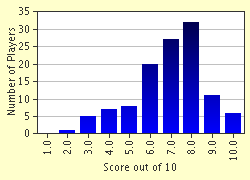Quiz Answer Key and Fun Facts
1. Which of the following is NOT a Celtic region?
2. Which of these instruments commonly features in Celtic music?
3. Which of these bands/artists is famous for Irish Celtic music?
4. Of the following, which is NOT a style of Celtic dance music?
5. Which Scottish author's poetry often "updated" Scottish folk music?
6. The violin and the fiddle are two distinctly different instruments.
7. Which of the following is NOT a real type of bagpipes?
8. Which of these regions of the United States has the most Celtic influence in its traditional music?
9. Name a geographical location in Canada famous for being influenced by Scottish culture, specifically music.
10. Is the Celtic tradition still alive today?
Source: Author
jacobite1745
This quiz was reviewed by FunTrivia editor
ralzzz before going online.
Any errors found in FunTrivia content are routinely corrected through our feedback system.

